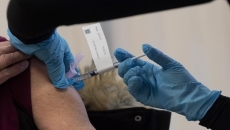A seemingly sharp decline of global COVID-19 cases has ignited exuberance among some infectious disease doctors and epidemiologists, even if they're not sure what exactly is causing that downward spike.
Charts and graphs depicting the COVID burden among most countries, including Canada and the United States, are showing steep dives from all-time highs just weeks ago.
Experts say a combination of factors is likely at play in the virus's apparent decline, including a seasonal aspect to SARS-CoV-2, some level of herd immunity in certain places, and the impact of lockdowns and our own behaviours.
That the drop is happening now, amid the threat of more transmissible variants, seems a little confounding though, says Winnipeg-based epidemiologist Cynthia Carr.
"That is the really interesting part about this," she said. "We know these variants spread much faster and we've seen them becoming more dominant, but the numbers still aren't spiking the way we might have anticipated."
Carr says the variants of concern — those first detected in the U.K., South Africa and Brazil — have been found in multiple countries and are quickly overtaking former strains in some places. In Berlin, for example, she notes the variant first detected in the U.K. is accounting for 20 per cent of new cases, up from 6 per cent two weeks ago.
Carr suspects part of the reason for a lack of rising cases might be because governments have gotten better at setting public health guidance over the last year, and people have gotten better at adhering to them.
But while the situation appears to be improving, Carr warns "we can't rest on our laurels now."
"Once (the variants) account for 90, 100 per cent of all infections ... we could really see that escalation," she said.
Dr. Sumon Chakrabarti, an infectious disease physician in Mississauga, Ont., agrees people shouldn't assume the pandemic is over because global cases are dropping. But the worldwide decrease is a positive development that shouldn't be overlooked, he added.
Chakrabarti says there are likely multiple reasons for the decline, with some countries' situations explained easier than others.
Inoculation efforts might be credited in Israel, for example, where 87 per cent of the population has been given at least one dose of a COVID vaccine. Countries like Canada meanwhile, which were mostly locked down over the last six weeks, can point to restrictions and limited contacts as a plausible reason for their COVID decline.
More than one factor could be working within different regions too, Chakrabarti added. And a possible seasonal aspect to the COVID virus may be an overarching theme.
Infections from certain viruses tend to peak once per season before tailing off naturally, Chakrabarti says, like influenza, which usually spikes between November and January. Other coronaviruses have followed a similar pattern.
"Seasonality means that (viruses) get cycled at some point during the season," he said. "We don't know if that's 100 per cent the case with COVID. But it could be."
While the timing of Canada's first COVID wave last spring would seem to go against the notion of seasonality, we weren't exposed to large quantities of the virus until March, so it didn't have a chance to circulate earlier, explains Chakrabarti.
Some parts of the world including the U.S. may also be dealing with some level of herd immunity brought on by natural infection, Chakrabarti says, which could simplify, but not fully explain, their recent case drop.
While exact numbers of total COVID infections are hard to gauge, Chakrabarti estimates undetected cases could be five to 10 times higher than reported cases, either because people were truly asymptomatic or had such minor symptoms that they never got tested.
"If you have a significant chunk of people who have been infected and have, maybe not necessarily full immunity but some degree of immunity, at the very least that should slow outbreaks," Chakrabarti said.
There are problems with the notion of herd immunity, however.
Dr. Prabhat Jha, an epidemiologist with the University of Toronto, says while experts believe people with past COVID infections may have some protection against the variants first detected in the U.K. and South Africa, that may not be the case with the one first found in Brazil.
Jha points out that not all countries are experiencing decreases in COVID cases — Brazil is one area seeing either steady rates or possible increases — and he worries that labelling herd immunity as a reason for case decline may be dangerous.
"We don't know what herd immunity actually means," he said. "It's a theory that at a certain number of people infected, the virus just runs out of customers. But we have very little basis to understand what that level is."
Jha says the potential reasons for the global decline are only theoretical right now.
"No one really has a clear sense of why the cases are dropping," he said. "So I think one needs to be very cautious when talking about plausible explanations."





